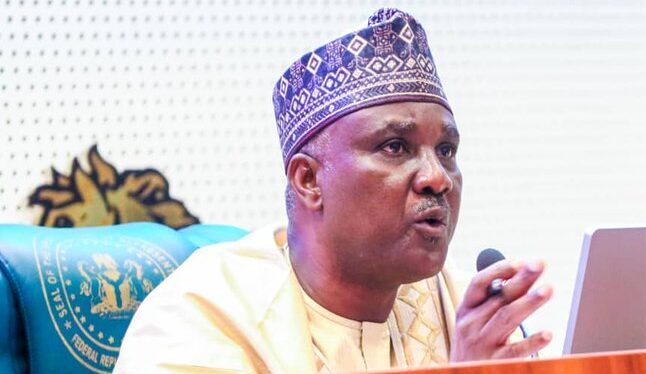Speaker of the House of Representatives, Hon. Abbas Tajudeen, has stated that Nigeria does not need passive observers but thinkers and builders to drive the country’s growth and development.
Abbas also said the youth, whom he described as “invaluable assets,” are best positioned to cause positive changes to the country, especially with technological innovations.
The Speaker made this known in a Convocation Lecture he delivered at the Federal University of Technology (FUT), Minna, Niger State, on Friday, titled: ‘From Crisis to Prosperity: Harnessing Technology to Drive Nigeria’s Transformation.’
In a statement by his special adviser on media and publicity, Abbas said he was “deeply honoured” by the invitation to deliver FUT-Minna’s Convocation Lecture.
He said: “In an age characterised by rapid technological advancements fundamentally altering economies and societies, Nigeria must seize opportunities for growth and innovation.
“By strategically leveraging technology, the nation can effectively confront pressing challenges, stimulate economic development, and improve its citizens’ overall quality of life.”
The speaker explained how the strategic adoption and implementation of technological solutions could transition Nigeria from its current crises toward a trajectory of sustainable prosperity.
“As Africa’s most populous nation and largest economy, Nigeria faces many socio economic challenges that hinder its development trajectory. Addressing these issues is crucial for the nation’s progress.
“This lecture focuses on how technology can transform Nigeria from a state of crisis to one of prosperity, offering innovative solutions to longstanding problems,” he said.
The speaker noted a pervasive belief that university degrees are inherently superior to technical polytechnic and college diplomas.
“This perception has led to an overwhelming demand for university admissions, often at the expense of technical and vocational education,” he said.
Consequently, Abbas further noted that there is “an erosion of technical skills essential for industrial development. Ironically, many university graduates pursue vocational skills after graduation, such as hairdressing, makeup artistry, and catering, which could have been more comprehensively acquired through technical education.”
He said: “In contrast, countries like the United Kingdom and Germany have robust technical education systems, where polytechnics and vocational schools are integral to driving industrial innovation. Nigeria must learn from such models by strengthening its technical education sector to meet industry demands.”
The Speaker also decried the “declining quality of graduates from Nigerian universities,” saying it reflects broader systemic issues, particularly the insufficient number and lack of quality of academic staff. He stated that Nigeria faces a significant shortage of qualified lecturers, with the lecturer-to-student ratio far exceeding global standards.
“This overcrowding severely limits the ability of lecturers to provide personalised attention and quality instruction, undermining the learning experience for students,” he stated.
Speaker Abbas also pointed out a shortage of qualified academic staff, which he said is further exacerbated by inadequate remuneration and limited opportunities for professional development.
He added: “Compounding these challenges is the commercialisation of education, which has led to unethical practices such as exchanging grades for money or sexual favours… These practices tarnish the integrity of academic institutions and erode public trust in the quality of education being delivered.
“The consequences of these systemic issues are evident in the poor performance of Nigerian universities in global rankings.”
To address these challenges, the speaker said targeted interventions, including increased funding for higher education, improved remuneration for academic staff, and expanded opportunities for professional development, were urgently needed.
He said stricter ethical standards enforcement and the implementation of transparent evaluation systems could help curb academic corruption and restore the integrity of Nigerian universities.
Abbas said, “Nigerian universities face chronic underfunding, severely impacting infrastructure, research capabilities, and overall educational quality. While university expansion aims to increase access to higher education, it often leads to stretched resources and diminished quality.
“A more strategic approach would focus on enhancing existing institutions through improved funding and resource allocation, drawing lessons from successful funding models employed by universities globally and within Africa.”
While noting that globally, universities adopt diverse funding models that reduce reliance on government allocations, the speaker said Nigerian universities must rise to this challenge by envisioning and developing a ‘Nigerian Innovation Corridor’ that fosters collaboration between academia, industry, and government.
Abbas added that by positioning themselves as drivers of technological transformation, Nigerian institutions could create a thriving ecosystem that competes globally and propels the nation into a future powered by innovation.
He said, “The youths of Nigeria represent invaluable assets to the nation. They exemplify intelligence, resilience, and a strong inclination towards innovation, particularly in the realm of technology. Leveraging digital tools for personal development and entrepreneurial ventures is essential.
“Young Nigerians are encouraged to utilise online learning platforms, engage in coding boot camps, and participate actively in technology communities to enhance their skills and entrepreneurial capabilities. The imperative for youth engagement is more pressing than ever, particularly in a rapidly evolving global economy driven by technology and innovation.
“The Nigerian government, under the leadership of President Bola Ahmed Tinubu, GCFR, has demonstrated its commitment to fostering an environment that supports young innovators through various initiatives.
“These initiatives aim to promote technological advancement by implementing policies that facilitate access to funding, mentorship programs, and platforms that stimulate innovation and entrepreneurship.”
